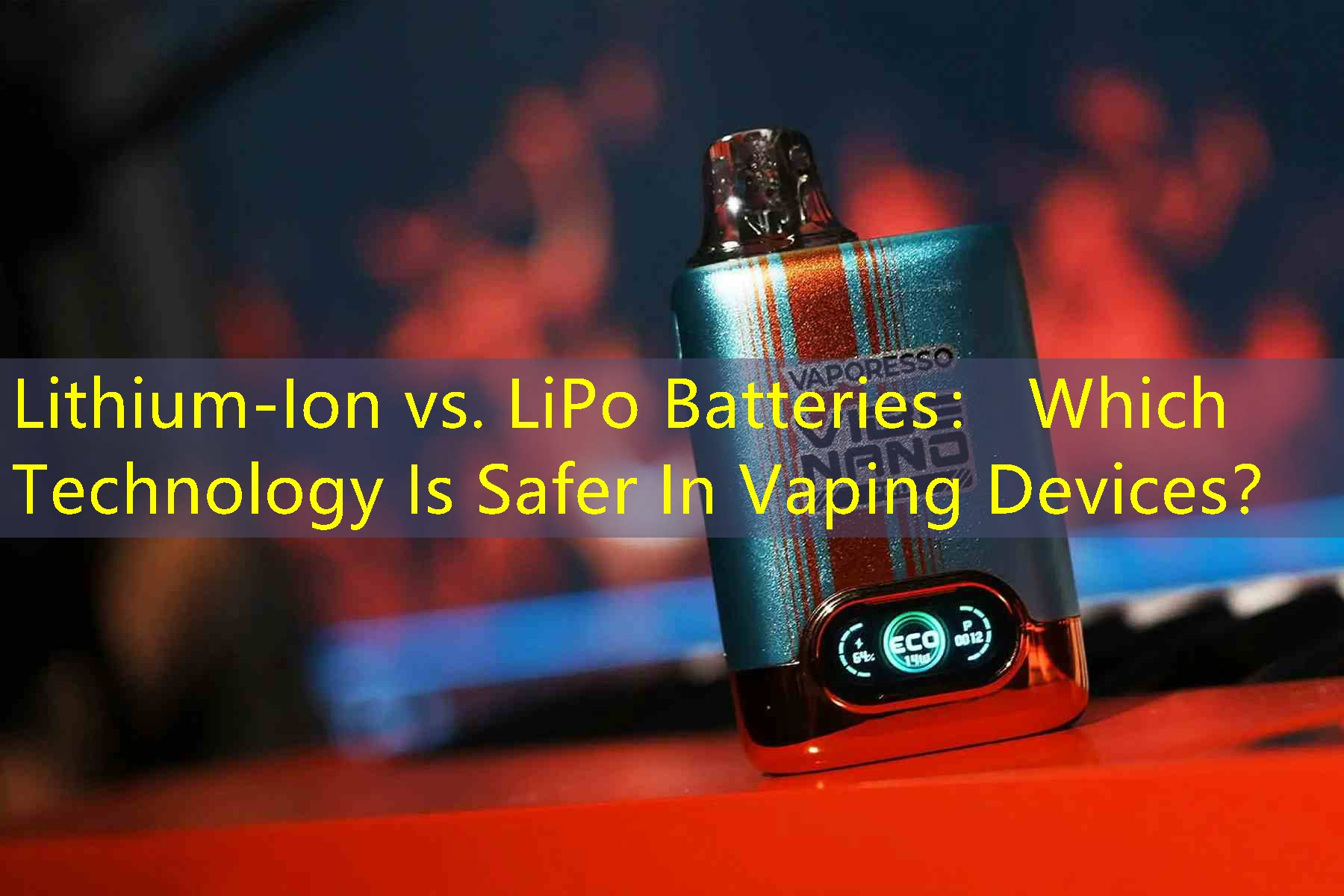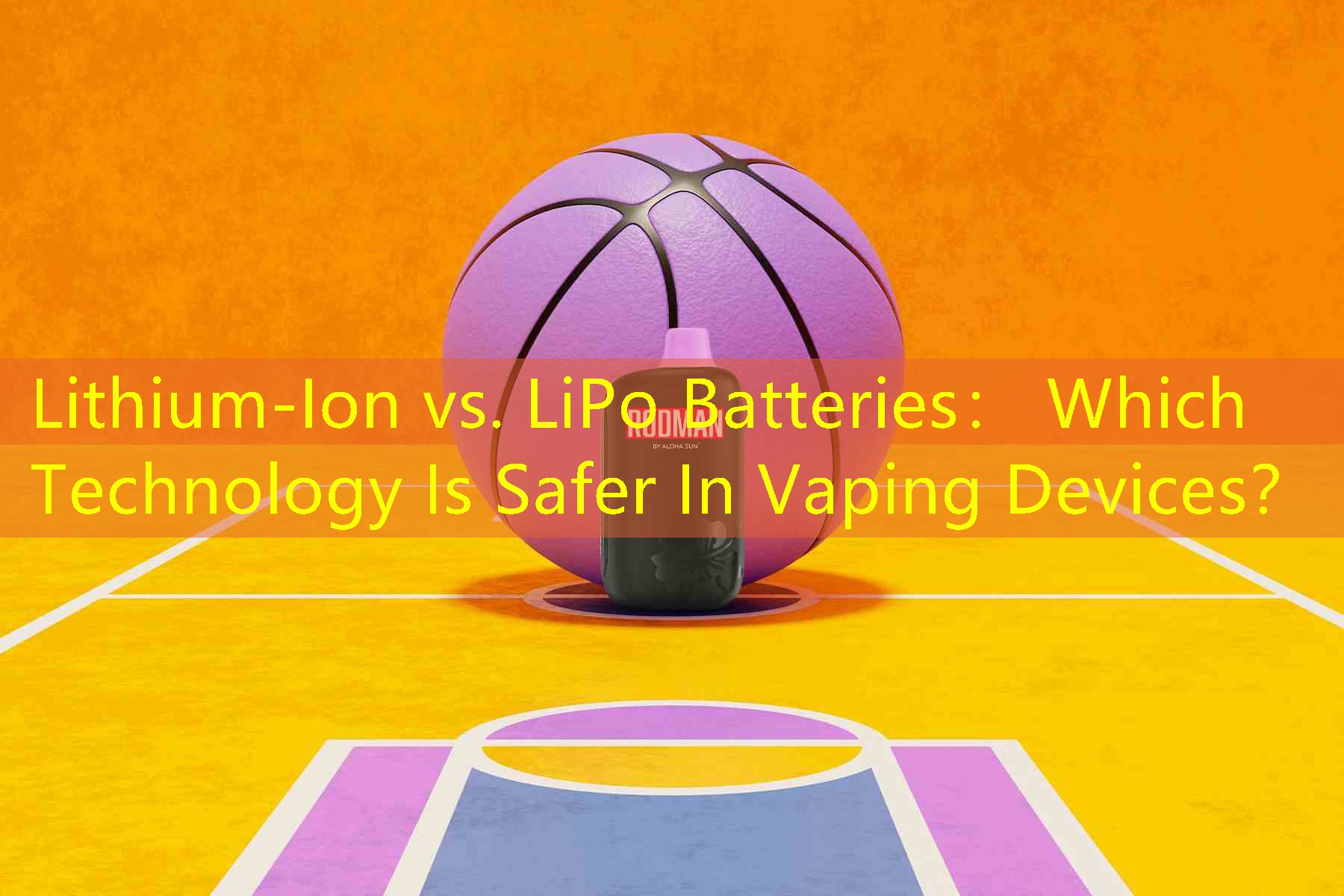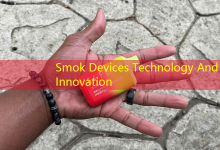Whakatuwheratanga
In the ever-evolving landscape of vaping devices, Ko te kowhiringa o te hangarau hiko e whai waahi ana ki te mahi, whakarurutanga, me te wheako kaiwhakamahi. Tokorua o nga momo pākahiko rongonui e kitea ana i enei taputapu he lithium-ion me te lithium polymer (Lipo) Pateka. Ko te maarama ki nga rereketanga o te haumaru i waenga i enei hangarau e rua he mea nui mo nga kaihanga me nga kaiwhakamahi. I roto i tenei tuhinga, Ka tirotirohia e maatau nga ahuatanga haumaru o te lithium-ion me te pākahiko lipo, whakarato whai kiko mo te hunga whakahihiri.
He aha nga peka lithium-ion?
Ko nga pākahiko-ion lithium-ion ko te whiringa kaha mo nga taputapu hiko maha, tae atu ki nga taputapu whakakeke. E mohiotia ana ratou mo to ratou kaha kaha, roa roa, me te whaikorero katoa. Ko te pākahiko lithium-ion angamaheni kei roto i te ahua cylindrical, tapawha ranei, which houses its cells and electrolyte solution. These batteries are designed with built-in safety features that help prevent issues such as overheating, short circuits, and overcharging. They also provide a consistent voltage output, which contributes to a reliable vaping experience.
Understanding LiPo Batteries
He rereke, Lithium Polymer (Lipo) batteries have gained popularity in recent years, particularly for use in drones and remote-control devices. LiPo batteries use a polymer electrolyte instead of a liquid electrolyte, which allows for a more lightweight and flexible design. This feature is particularly appealing for compact vaping devices. While LiPo batteries can deliver high discharge rates and are often lighter than their Lithium-Ion counterparts, they can be more sensitive to damage and require careful handling to ensure safety.
Safety Comparison: Lithium-ion vs. Lipo
When it comes to safety, both battery technologies have their advantages and disadvantages. Below is a comparative analysis of the safety features of Lithium-Ion and LiPo batteries:
| Feature | Lithium-Ion Batteries | Tuhinga o mua |
|---|---|---|
| Risk of Fire | Low; built-in protective circuitry minimizes risks | Higher; more susceptible to puncture and short circuits |
| Durability | More durable; can withstand physical stress | Sensitive; physical damage can lead to failure |
| Rangi pāmahana | Wider operating range; more tolerant of temperature extremes | Narrower range; sensitive to heat and cold |
| Whakatanga | Usually equipped with smart chargers that prevent overcharging | Requires special chargers and careful monitoring |
Handling and Maintenance Considerations
Proper handling and maintenance are crucial for both Lithium-Ion and LiPo batteries in vaping devices. Users need to adhere to specific guidelines to maximize safety.
1. Storage: Always store batteries in a cool, pae, away from direct sunlight and extreme temperatures.
2. Chargers: Use only compatible chargers designed for the specific battery type to prevent overcharging and damage.
3. Inspection: Regularly inspect batteries for physical damage, signs of swelling, or leakage. If any issues are detected, discontinue use immediately.
Real-World Incidents
While both Lithium-Ion and LiPo batteries can be safe when used properly, there have been incidents that highlight the risks associated with improper handling. Hei tauira, a YouTube channel dedicated to vaping documented an incident where a LiPo battery exploded due to a puncture, leading to significant damage to the device and posing a risk to the user. Hapa, reports of Lithium-Ion batteries malfunctioning typically relate to poor quality or improper usage, emphasizing that user behavior significantly impacts battery safety.
Nga Pātai Auau
Which battery type lasts longer for vaping?
Lithium-Ion batteries generally have a longer lifespan compared to LiPo batteries. They can withstand more charge cycles before degrading, making them more cost-efficient in the long run.
Are LiPo batteries more powerful for vaping?

Āe, LiPo batteries can deliver higher power outputs due to their ability to handle more significant discharge rates. Hoianō, this power comes with increased safety risks that need careful consideration.
Can I use a LiPo battery in a Lithium-Ion device?
It is not advisable to use a LiPo battery in a device specifically designed for Lithium-Ion batteries. The differences in voltage and discharge rates can lead to device malfunctions and potential safety hazards.
This article explores the critical aspects of battery safety in vaping devices, enhancing your understanding of the implications of battery technology choice. For those keen on optimizing their vaping experience, purchasing reliable batteries is key, and options are available on our website.








